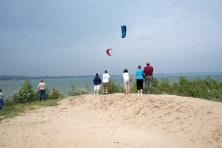Baileys Harbor to Fund Public-transportation Study
- Share
- Tweet
- Pin
- Share

Town board tables Brann Field discussion, adopts STR ordinance
The Baileys Harbor Community Association (BHCA) requested $5,000 from the town board for a transportation study, which the board approved.
“We want to limit one- or two-person cars and limit traffic,” BHCA treasurer Carin Hickey Stuth said.
The study will examine the possibility of creating a public-transport system similar to the one Sister Bay implemented in 2019, with BHCA intending to ask the same consultant, Sophie Parr, to do the study.
In 2021, Louise Howson – the Sister Bay Advancement Association’s community coordinator and a founding member of the Peninsula Transit Coalition – visited each of the Northern Door communities to share the story about how to start a fixed public-transportation system and why it’s needed. The goal was to persuade more communities to commit to the concept so that together, the municipalities could better serve the whole region.
The Baileys Harbor study will consider transport routes from Baileys Harbor to Sturgeon Bay, Egg Harbor and Sister Bay, potentially running limited-time bus and van trials during the summer of 2023.
“We want to give it a try to see what might work,” Stuth said.
The board approved BHCA’s $5,000 request during an Oct. 5 special meeting, though the budget won’t be finalized until November.
Brann Field Discussion Tabled
Though the Baileys Harbor Town Board has been discussing Brann Field since August, the board opted to table the issue during its latest meeting on Oct. 5.
Visitors, customers and employees of nearby businesses use Brann Field as overflow parking. One of the entrances to Brann Field is through the parking lot of Lakeshore Adventures, and the town has been deliberating whether to close that entrance.
According to Lakeshore Adventures owner Todd Haleen, people have been using the entrance for years with no problems. Closing it was brought up to the town board only after he constructed his building, he said.
“This has nothing to do with parking,” Haleen said. “It’s a personal vendetta.”
The issue returned to the board after town attorney Tyler Pluff told the plan commission Oct. 3 that leaving the Lakeshore Adventures entrance open could be a liability for the town. Commission members concurred, voting unanimously to recommend that the town close access to Brann Field from the Lakeshore Adventures parking lot.
The town supervisors did not reach the same conclusion that the commission members did. Following a 30-minute discussion during the Oct. 5 meeting, the supervisors tabled the issue after the discussion brought them no closer to a decision. According to town chair Don Sitte, this was a problem at previous meetings, too.
“We’ve been going around and around for months,” he said.
Short-term-rental Ordinance Adopted
The Baileys Harbor Town Board adopted a short-term-rental (STR) ordinance that will require STR owners to obtain a license from the town. The cost of the license will be $500 initially and $250 thereafter.
The ordinance, which the town’s plan commission had drafted and recommended, will not go into effect until January 2024.
Baileys Harbor’s ordinance is similar to others passed in Door County, with its purpose being to establish safety and maintenance standards, determine owners’ responsibilities and allow for rule enforcement. It will ensure proper wastewater treatment, set occupancy limits, regulate quiet hours and require a drive-in garbage service, among other rules.
According to town supervisor Peter Jacobs, STRs should be regulated because unlike other businesses, they convert residential properties into commercial businesses, often changing the makeup of the surrounding neighborhood.
“STRs are a unique operation,” Jacobs said.
The town has also encountered issues with what the board called “party houses,” or STRs that house large numbers of visitors who disturb the rest of the neighborhood.
About five STR owners spoke during the meeting, expressing what has been expressed by other STR owners in other municipalities where ordinances have been considered and passed. Some argued that it was unfair to charge all STR owners in an attempt to regulate a few who have caused problems, and others questioned the fairness of requiring STR businesses to pay a fee to operate in the town when other local businesses are not subject to the same requirement.


